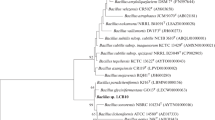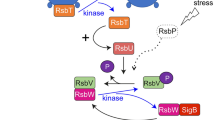Abstract
A temperature increase from 35° to 40–42°C enhances the rise of cytoplasmic serine proteinase (ISP1) activity in Bacillus megaterium incubated in a sporulation medium. A temperature shift from 27°C in the growth medium to 35°C in the sporulation medium has the same effect. Elevated temperature stimulates the increase of ISP1 level when applied immediately after the transfer of cells from the growth to the sporulation medium (at T0) or at T3, when sporulation becomes irreversible. The cytoplasmic PMSF-resistant activity or the proteolytic activity associated with the membrane fraction is stimulated only slightly or not at all. A temperature increase to 45–47°C suppresses the rise of proteolytic activities in all cell fractions. In addition to the elevation of the ISP1 activity by an upward temperature shift, the rise of this enzyme in nongrowing cells is also stimulated by osmotic stress. In growing populations, in contrast to the rise of the ISP1 activity caused by elevated temperature in nongrowing cells, this proteinase is induced by low temperatures (24–27°C). The ISP1 activity roughly correlates with the enzyme protein concentration determined by immunoblotting.
Similar content being viewed by others
Literature Cited
Burgman PWJJ, Konings AWT (1992) Heat induced protein denaturation in the particulate fraction of HeLA S3 cells: effect of thermotolerance. J Cell Physiol 153:88–94
Burnett TJ, Shankweiler GW, Hageman JH (1986) Activation of intracellular serine proteinase in Bacillus subtilis cells during sporulation. J Bacteriol 165:139–145
Cheng YSE, Aronson AI (1977) Characterization and function of intracellular proteases in sporulating Bacillus cereus. Arch Microbiol 115:61–66
Craig EA, Gambill BD, Nelson RJ (1993) Heat shock proteins: molecular chaperons of protein biogenesis. Microbiol Rev 57:402–414
Goldberg AL (1992) The mechanism and functions of ATP-dependent proteases in bacterial and animal cells. J Biochem 203:9–23
Kučerová H, Chaloupka J (1985) Suppression by temperature of sporulation and exocellular metalloproteinase synthesis in Bacillus megaterium. FEMS Microbiol Lett 28:293–296
Kučerová H, Moravcová J, Váchová L, Ludvík J, Chaloupka J (1993) Netropsin suppresses the rise of activity of an intracellular proteolytic system in sporulating Bacillus megaterium. Curr Microbiol 26:287–292
Kučerová H Strnadová M, Vinter V, Votruba J, Chaloupka J (1994) Dual effect of amino acids on the development of intracellular proteolytic activity in the irreversible sporulation phase of Bacillus megaterium. Curr Microbiol 28:345–349
Millet J (1971) Caractérisation d'une endopeptidase cytoplasmic chez Bacillus megaterium en voie du sporulation. C R Acad Sci III 272:1806–1809
Sedlák M, Vinter V, Adamec J, Vohradský J, Voburka Z, Chaloupka J (1993) Heat shock applied early in sporulation affects heat resistance of Bacillus megaterium spores. J Bacteriol 175:8049–8052
Sheehan SM, Switzer RL (1990) Intracellular serine protease 1 of Bacillus subtilis is formed in vivo as an unprocessed, active protease in stationary cells. J Bacteriol 172:473–476
Strnadová M, Prasad R, Kučerová H, Chaloupka J (1986) Effect of temperature on growth and protein turnover in Bacillus megaterium. J Basic Microbiol 5:289–298
Strnadová M, Věchet B, Chaloupka J (1990) Elevated content of hsp70 does not induce tolerance of sporulation to higher temperature. Folia Microbiol 35:130–137
Strnadová M, Votruba J, Chaloupka J (1992) Turnover kinetics of proteins labeled in different sporulation phases of Bacillus megaterium. Folia Microbiol 37:163–168
Szulmajster J, Keryer E (1975) Isolation and properties of thermosensitive sporulation mutants of Bacillus subtilis deficient in intracellular protease activity. In: Gerhardt P, Costilow RN, Sadoff HL, (eds) Spores VI. Washington, DC: Am Soc Microbiol, pp 271–278
Váchová L, Kučerová H, Chaloupka J (1990) Protein degradation during sporulation of Bacillus megaterium: effect of actinomycin D. Curr Microbiol 21:289–293
Váchová L, Kučerová H, Benešová J, Chaloupka J (1994) Heat and osmotic stress enhance the development of cytoplasmic serine proteinase activity in sporulating Bacillus megaterium. Biochem Mol Biol Int 32:1049–1057
Author information
Authors and Affiliations
Rights and permissions
About this article
Cite this article
Kučerová, H., Chaloupka, J. Intracellular serine proteinase behaves as a heat-stress protein in nongrowing but as a cold-stress protein in growing populations of Bacillus megaterium . Current Microbiology 31, 39–43 (1995). https://doi.org/10.1007/BF00294632
Issue Date:
DOI: https://doi.org/10.1007/BF00294632




